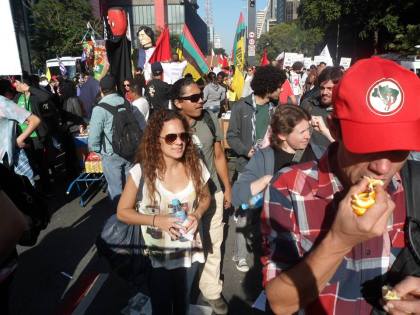The 2014 Brazil World Cup has kicked off to be one of the most exciting world sporting events in history, yet not everyone is cheering.
The costs involved in hosting the cup has surpassed $14.5 billion, making it the most expensive World Cup ever held. Such expenditure has had a profound impact on the societal and economic structures of Brazil and its people.
Poverty is widespread, and basic necessities such as health care and education continue to be swept under the soccer pitch; leaving thousands of Brazilians impoverished and neglected.
The lack of financial care toward its nation as well as the widespread neglect of basic human rights has sparked a number of protests and revolts against the Brazil government, which has led to forceful rebellion and tactical violence from the military. These protests show the true visuals of the World Cup, not the peace and solidarity as fed to us by the media.
The Brazil Bishop’s conference has ordered the FIFA World Cup organizers an official ‘red card‘ as a result of the Brazil government putting a sporting competition over the needs of its nation and its people. A nation whose poverty rate remains around 21.4 percent. (CIA Factbook 2013)
In order to gain more of an understanding of the true realities being faced by Brazil and its people, we’ve been privileged to have received a personal email from Brazil YCW about their reflections on the World Cup and the implications it has had on them, its young workers, and Brazil society as a whole.
Here’s what they have to say:
BYCW about World Events in Brazil
The Brazil Young Catholic Worker (BYCW) understands that the World Cup 2014 and Olympics 2016 are not isolated events, but are part of the set of major works and major events of the economic growth of the country program, implemented by the federal government. These projects, funded widely by public funds, benefit large construction companies, large corporate groups and large national and international capital operating in Brazil. They are who make the decisions and also those who are benefiting from the wealth produced.
The interests involved in these works do not take into account the profound social, cultural and environmental impacts that the realization of the semega events causes. The population of the 12 cities hosting the Games is the most affected. They are provided for changes in the transport sector, but not necessarily in the lines and areas of transport used by the majority of workers, such as airports, expansion or construction of subways.
Many houses are being removed from urban centres to areas without infrastructure, without dialogue with the people involved, and without the payment of fair compensation, especially in Rio de Janeiro. Not to mention a number of violations of other human rights, including an increase of prostitution, the exclusion of informal workers, non-compliance with the laws of the country regarding the use and accountability of public resources, that in the end, only benefits the event’s sponsors, protecting them.
New jobs are temporary and offered in very poor conditions, especially in construction and services. Again, it is being shared with the common workers (the population’s majority) only the negative consequences of economic growth. As in other World Cup’s editions, most people, even if they wanted to, cannot afford to buy a ticket to watch the matches in the stadium.
Many social movements and organizations have been reflecting and building up actions to combat the development model. For the most part, they are not opposed to the organization of events, since, particularly football, do belong to the cultural identity of the Brazilian people. However, they seriously question the way it’s being done, which has been based mostly in force and injustice.
The main demands are:
- use of public resources according to the needs of the majority and not favoring certain economic groups;
- disapproval on the use of public funds for private purposes;
- transparency in the actions of governments at all levels;
- monitoring the use of public funds;
- dialogue with the population involved in the areas of removal;
- respect for all human and environmental rights;
- compliance with labor laws;
- respect for the laws of the country.
- democratization of the media.
In this sense, the YCW Brazil has discussed about reality among young workers, with other youth workers organizations, and participated in marches to denounce the arbitrariness of the capitalist model. We also realize that street protests are taking place, more intensively since April 2013, mostly showing a social nature, but few have concrete proposals. However, we understand that all of this is important to think about the society. We want to take steps toward building a society that respects diversity, solidarity and equity.
National Team of Brazil YCW



